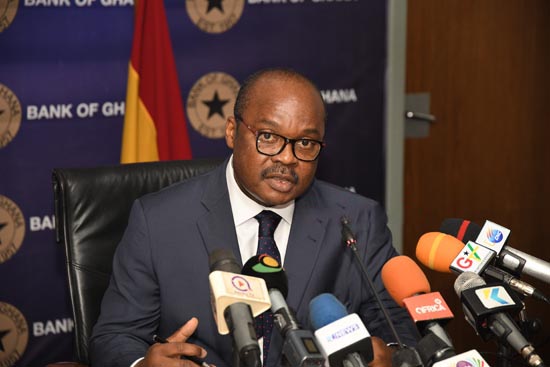Governor of the Bank of Ghana (BoG), Dr Ernest Addison, has stated that the central financial institution underneath his management took the requisite prudent coverage measures to stabilise the economy in addition to the monetary sector earlier than Covid struck.
At the time he got here into workplace in April 2017, he stated, the nation had inherited an International Monetary Fund (IMF) programme that was off observe.
“We put it back on track, and successfully completed the programme in April 2019,” he stated.
He added that the monetary sector clean-up was very excessive on the agenda in placing the system again on observe.
“The issue of resolving the first, two [insolvent] banks came very early on – I had been in office for barely three months. This was a prior action that was required to proceed to the next stage of an IMF board approval for disbursements to Ghana in August of 2017. Then, barely a year after that, based on the work of the supervision department of Bank of Ghana, we had to close five more banks that were insolvent. Contextually, these banks had previously received excessive liquidity support from the Bank of Ghana, some of which was misused. By the end of 2018, we had closed down nine banks, 23 savings and loans institutions and 347 microfinance institutions. That was the context,” Dr Addison informed centralbanking.com.
The 9 banks that collapsed through the monetary sector clear up had been UT Bank, Capital Bank, UniBank, The Royal Bank, The Beige Bank, Sovereign Bank, The Construction Bank, Premium Bank and Heritage Bank.
Dr Addison said that it was clear these banks weren’t viable and simply giving them liquidity help was not going to alter something.
“We needed to go ahead and resolve them, put them into receivership and then transfer the positive elements. In the case of the first two banks, we transferred the good assets and liabilities to a larger commercial bank. And then, in the second instance, we had to create a bridge bank, putting all the good assets and liabilities of the five banks in one new bank. Given the circumstances or the time, we couldn’t have done it differently,” he stated.
On the macro aspect, he added “we started off with a robust fiscal stance. From 2017 through to 2019, central bank financing of the budget was zero, even though the Bank of Ghana Act pegged it at 5% of the previous year’s tax revenue.”
In that context, he stated, inflation declined in a short time. Therefore, the financial coverage fee additionally got here down, and progress rebounded strongly.
“This was the context for the first three years of the current administration,” he harassed.
“By the tip of 2019, the monetary sector clean-up was accomplished. The major banks had been strengthened and the weaker banks had been out of the system. The banking sector was poised, with the extra capital via the recapitalisation course of, to help monetary intermediation. Then, out of the blue, we had Covid-19 pandemic.
“The authorities’s response to the pandemic, was captured by the president’s well-known citation that ‘we all know tips on how to carry the economic system again, however we do not know tips on how to carry human lives again’. This was the philosophy behind the federal government’s method in coping with Covid. Therefore, authorities spending was ratcheted as much as help a number of intervention schemes that had been put into place to mitigate the affect of Covid. Obviously, with income shortfalls, the financing of those large-scale expenditures grew to become a problem.
“Prior to that, we had not accomplished any financial financing, that’s financing of the price range had been zero. Therefore, offering financing help to the federal government was not a straightforward transition for us to make. We had some good discussions going into it. The finance minister went to Parliament and requested for a suspension of the Fiscal Responsibility Act because of the pandemic. This enabled us to set off emergency provisions within the Bank of Ghana Act to offer distinctive financing for the federal government price range. And that is what we did.
“For me, it was a big reawakening, because I did not foresee that the central bank would be drawn into budget financing. But, given global developments especially with central banks in advanced economies, it seemed like monetary accommodation of fiscal policy to meet Covid expenditures had become part of the norm. In addition, the IMF itself allocated additional SDRs, which are assets held by central banks, and designated these SDRs to help governments meet their Covid expenditures. This meant the central bank could automatically lend on these additional resources to meet the needs of the budget. This changed the psyche – having to on-lend IMF resources plus triggering the emergency provisions to provide central bank financing to the budget. This was difficult for me.”







